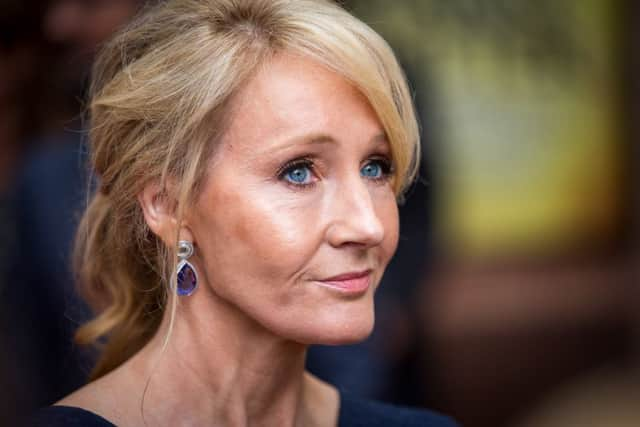Dani Garavelli: Politics is for Muggles not wizards, JK


This will do nothing for my literary credentials, I’m sure, but if I were on Mastermind I would choose the Harry Potter novels as my specialist subject. By dint of having given birth to a convocation of wizard-crazy muggle boys, I am an inadvertent expert on the titanic battle between good and evil in which Potter – aka the Chosen One – succeeds in his quest to destroy seven horcruxes and rid the world of Voldemort.
Not only have I read each of the books three times (once for each child) and seen all the films, I have ticked off most of the boxes on the Harry Potter tourist trail. I have peered in the windows of the Hogwarts Express at the National Railway Museum in York, watched other steam trains chug their way over the Glenfinnan viaduct and had my photo taken on platform 9 3/4 at King’s Cross. At the Warner Bros Studio in Leavesden, I supped a butterbeer (like American cream soda, seeing as you ask), boarded the Knight Bus and chapped on the door of 4 Privet Drive.
Advertisement
Hide AdAdvertisement
Hide AdThe joyless snobbery some book-lovers harbour towards the series is lost on me. I have become embroiled in late-night discussions over potential plot flaws and I have shed actual tears over the death of Dobby. But, in all those years of Pottermania, never have I thought of its protagonists as yardsticks against which the behaviour of real-life leaders should be measured, nor of its whole as a prism through which world events should be viewed.
Bizarrely, that’s where we are now at with British politics. For the last few days, the internal strife that is tearing the Labour Party asunder has been reduced to a Twitter stramash over whether Jeremy Corbyn does or does not resemble Dumbledore, the wise (but entirely fictional) head of Hogwarts.
Corbynistas have embraced the comparison, which is based on both men having white beards and the notion that the attempted coup by Labour MPs is redolent of the Ministry of Magic’s (although the Ministry of Magic successfully ousted Dumbledore, at least in the short term, whereas a recent YouGov poll suggests Corbyn will be re-elected with an increased majority).
Rowling, taking umbrage (or Umbridge – geddit?) at the co-opting of one of her characters to the Labour leader’s cause then unleashed a series of tweets disputing any such similarity. Which in turn led to accusations that she had defected to the Death Eaters.
If this all seems facile, then it is a reflection of the superficiality of a battle which – despite its high stakes – has been conducted largely through the medium of online pile-ons, and which has seen both sides fixate on stories as fatuous as Corbyn’s inability or otherwise to get a seat on a train and policies as weird and unworkable as outlawing after-work drinking sessions.
When it comes to drawing tortuous analogies between politics and Harry Potter, and given we’re reduced to the language of the playground, it seems fair to point out: Joanne started it. Ever since she became a Twitter phenomenon, she has behaved as if her characters were autonomous beings who exist outwith the pages of her books. So we have been subjected to a debate over Dumbledore’s sexuality (harmless enough) and an explanation as to why she couldn’t support a cultural boycott of Israel, even though Harry would be disappointed.
I’m not one of those who argue that Rowling should keep to what she does best and stop proffering political opinions. As a single mother who experienced life on the breadline, and as a multi-millionaire who lost her place on Forbes’ rich list as a result of charitable giving, she has plenty to contribute to any discussion. But this constant harping back to her imaginary world is a drag. If it’s a marketing ploy to keep the Potter franchise in the public eye, then it’s cynical. And if it’s because she can’t let go, then it’s a bit sad. Either way, it undermines her credibility and lowers the quality of the debate.
There is another aspect to last week’s Twitter row – a subplot, if you like – and that’s what it reveals about online abuse. Social media isn’t an issue for pupils at Hogwarts who communicate by owl post, trolling via “howlers”: letters that turn into pejorative-purveying mouths.
Advertisement
Hide AdAdvertisement
Hide AdAfter Rowling, who supports Corbyn’s rival Owen Smith, re-entered the fray last week – and particularly since she tweeted: “This isn’t bloody funny” about the prospect of a Corbyn win – she has received a barrage of offensive tweets. Although this kind of response is not unusual in the political sphere, online nastiness has been the defining characteristic of the Corbyn campaign, with the Labour leader frequently being called on to keep his Momentum “attack dogs” under control.
At the same time, there is something discomfiting about the way Rowling responds to hostility. She is entitled to call out those resorting to personal jibes, but does she really need to RT dissenting but non-abusive messages from people with a few hundred followers to all her 8.1m followers? Isn’t the prospect of being ridiculed on a grand scale intimidating for ordinary people who have as much right to express an opinion as she has?
The whole saga trivialises impending catastrophe: the Tory Party in government, the Labour Party unelectable for a generation, hundreds of thousands abandoned to austerity politics. Rowling is spot-on when she says: “One day in the far distant future we will look back and we won’t laugh, Labour.” So let’s leave the fantasy world of Hogwarts where it belongs: on our children’s bookshelves and in their imagination. Let’s stop wallowing in self-infantalisation and have grown-up conversations reflecting the significance and sheer, real-world awfulness of the crisis unfolding in front of us.